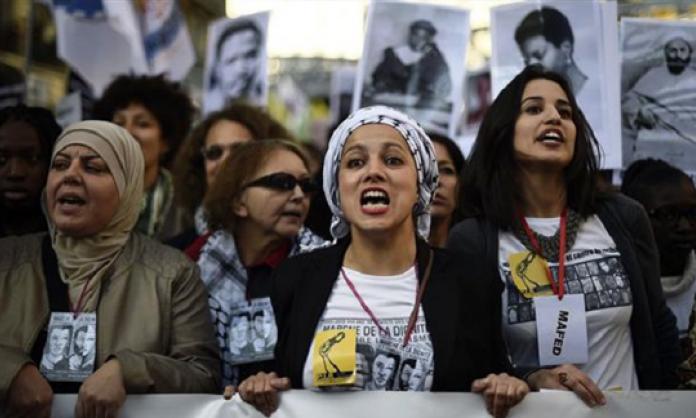Anti-racists made their presence felt on the streets of Paris at the March for Dignity and Against Racism on 31 October. More than 10,000 responded to a call from Amal Bentounsi, whose brother, Amine, was shot and killed by a police officer in 2012.
Amine was just one among many who have been murdered and tortured at the hands of the French police. Unsurprisingly, the immense majority of them aren’t called Dubois, Martin or Robert. They have names such as Abou Bakari Tandia, Lamine Dieng, Abdelhakim Ajimi, Ali Ziri and Mohamed Boukrourou.
The demonstration took place just before the 10th anniversary of the mass riots of popular quarters in Paris and around the country. Those rebellions predominantly involved the children of immigrants from North Africa and sub-Saharan Africa.
This demonstration, like those riots, was not an appeal to the state, but an attempt to cohere an anti-racist movement that intransigently opposes the status quo.
This is important. More than 30 years, ago the first national march against racism reached Paris from Marseille. Hopes of an end to racism and state repression were raised, but subsequently coopted by organisations such as SOS Racisme, an NGO, and the Socialist Party.
They channelled the anti-racist struggle into the polite corridors of power. They wanted to limit it to a pro-state demonstration of good will.
But while a sense of good will might have made some people feel warm inside, it was of little use to those who continued to endure the state’s racism and police violence.
Out of the 2005 riots echoed the call, les Indigènes de la République (Natives of the Republic), under which a new sequence of anti-racist initiatives began.
Today there are undocumented residents organising for housing, jobs and equal rights. There are families mobilising against police violence. There are collectives in the suburbs. There is Palestinian solidarity that defies a state ban on demonstrations. The Roma, the most oppressed group in Europe, are organising for their rights.
These campaigns act independently of the state and have the potential to unify in struggle. This would open the road for a real challenge to police violence and other oppressive measures. This is what marching for dignity is all about.










